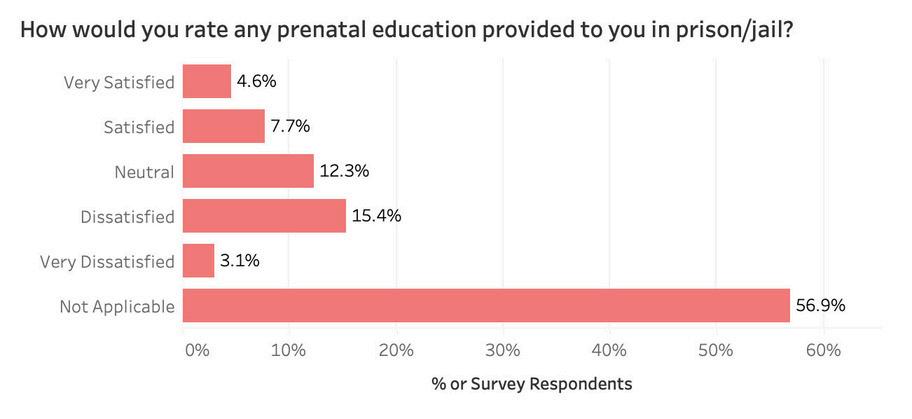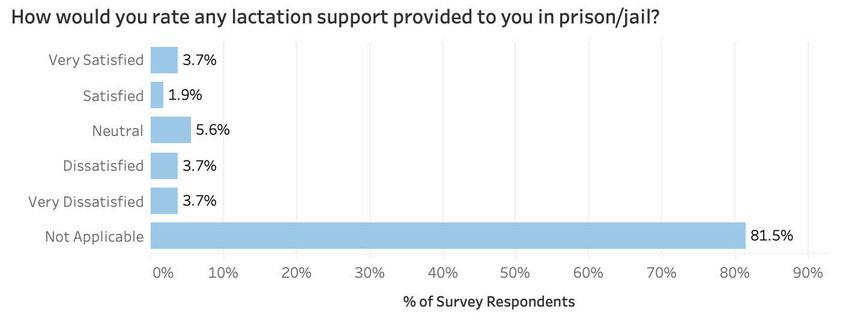

2025 Survey Responses
Demographics of Survey Participants
In May 2025, I Be Black Girl distributed a survey to over 80 incarcerated women and femmes in Nebraska. The majority of survey respondents identified as White (32.3%), followed by those who identified as Other (20%), Black or African American (13.8%,) and American Indian or Alaska Native (10 8%):

The majority of women and femmes who took the Now Home survey identified as Heterosexual (49.2% of respondents) or as Bisexual (29.2% of respondents):
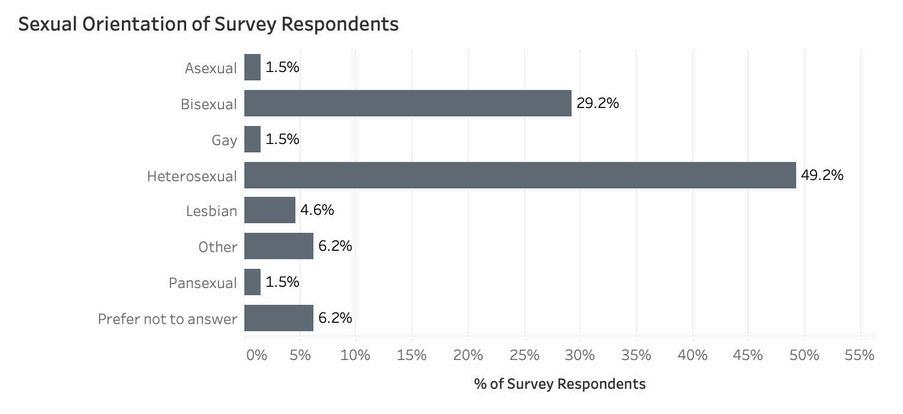
The majority of survey participants were between 35-44 years old (32 8%) The age category with the second highest number of participants was 25-34 year olds (27.9%), and 45-54 year olds made up 21.3% of survey respondents.

The majority of survey participants have only been incarcerated once (39 3% of survey respondents) Almost twenty percent (19 6%) of the group had been incarcerated twice:

Reflections on Housing Support
One survey question asked respondents to describe what “safe and stable housing” meant to them, and several key themes emerged. First, many respondents underscored the critical importance of housing affordability, and second, respondents recognized that housing stability encompasses both physical security and emotional well-being. Many expressed concerns about potential violence, theft, eviction, and financial hardship. One respondent stated that safe and stable housing meant, “a place where no one will hurt me,” Others underscored the role of financial accessibility in attaining safe and stable housing, “housing that doesn't cost all of my paycheck and is in good condition,” and “where I can live and not worry about being kick[ed] out plus I can afford the rent ”
Survey responses define stability as an environment that meets essential needs such as hygiene, personal space, and peace of mind Safety is a recurring theme, captured in quotes like “A place [where] I don't have to worry about my belongings being stolen or my safety being at risk” and “Somewhere I can be comfortable and do my time without having to watch my surroundings and be paranoid ” Additionally, a survey response asking for “felon-friendly yet safe” housing highlights the challenges posed by criminal records and housing discrimination, emphasizing the urgent need for inclusive policies that support women and femmes’ housing needs when returning to community.
Faith, family, and community are also significant factors in shaping perceptions of stability, as respondents express desires for housing surrounded by love, support, and security. One respondent envisioned, “a secure affordable house in a nice safe neighborhood with a loving family or community blessed by God.” Others emphasized the need for housing with dignity - “accommodation and care as a human being, some empathy” and “Having a consistent place to go where all my needs are being met (food, sleep, hygiene) safe—an environment where there aren't any harmful situations occurring ” For mothers, housing takes on an additional layer of responsibility: “A housing environment that is safe for my child and me Stable when I can afford to live in it ” These responses suggest a holistic and comprehensive response is necessary to meet the housing needs of women and femmes returning to their communities To be truly “stable,” housing must meet the person’s financial, social, safety, psychological, and community needs These narratives reflect the urgent need for more flexible housing options for women and femmes, stronger systems for culturally-appropriate support services, and policies that acknowledge and address the vulnerabilities faced by women returning to their communities.

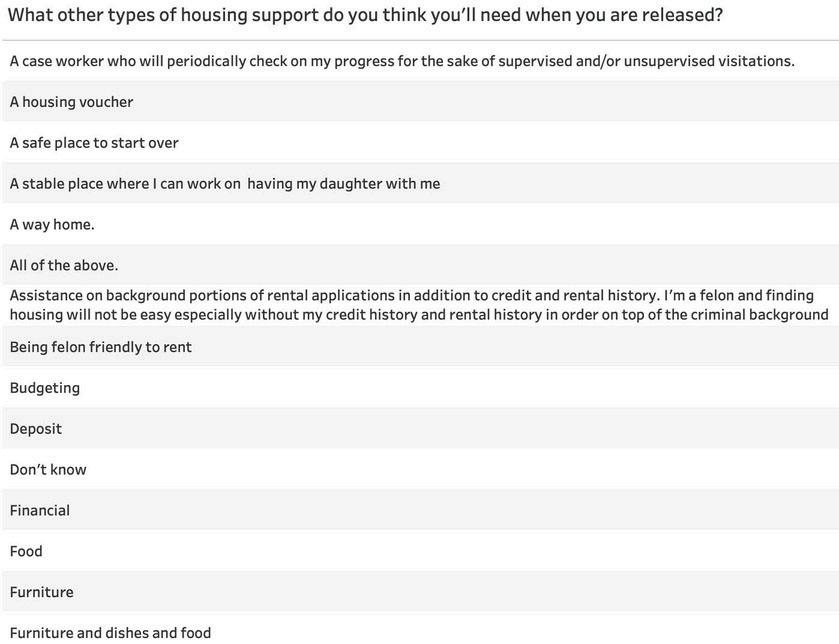
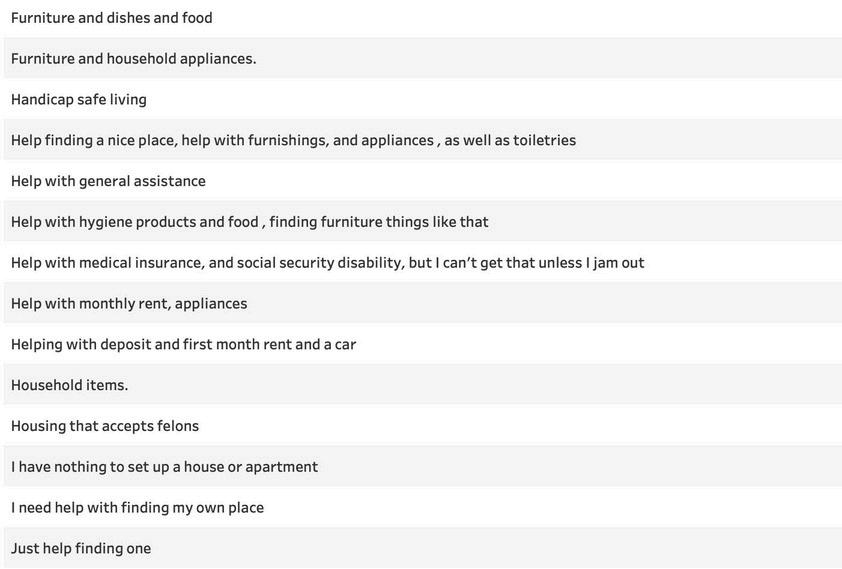

Reflections on Maternal Health Care
Survey participants shared powerful reflections on the maternal health care they have received while in prison, highlighting inconsistencies and challenges in the system. Access to adequate maternal healthcare appears uneven, with one respondent stating, "Medical treatment is not good here where I am. You can keep telling them there is something wrong or hurts, they just overlook it." Concerns regarding bodily autonomy also emerged, as one incarcerated woman shared, "If the medical department would have been honest with me, NOT removed my UTERUS without my knowledge or permission, leaving me unable to carry children I was depressed for many years here after the partial hysterectomy and still find myself very sad about it at times I was never even given counseling " Yet another survey respondent described the forced administration of medication, stating, "They put people on an involuntary medication order when they can't control them, and give them shots in the butt of Haldol That's the go-to That's what happened to me and many others " These experiences point to a need for clearer healthcare practices that respect patient rights and autonomy, such as informed consent and trauma-informed care
Beyond medical concerns, the emotional and psychological effects of incarceration are significant. One respondent emphasized the importance of family support during childbirth, sharing, "To encourage family support more in birth." The absence of loved ones during such a life-changing moment can deepen feelings of isolation. Another respondent simply acknowledged the difficulty of accessing maternal healthcare while incarcerated: "Yes, faced [the] challenge of accessing maternal health services while incarcerated." These perspectives underscore the importance of ensuring access to respectful and informed maternal care, and providing support structures that recognize the dignity and needs of incarcerated women and femmes.
When asked how they would rate various aspects of maternal health care in prison, overall there were notably low rates of positive responses For example, when asked to rate the physical exams and tests received in prison, zero respondents reported that they were Very Satisfied, and only 12 7% of respondents reported they were Satisfied with their services The majority of respondents felt Dissatisfied (10 9%), Very Dissatisfied (7 3%) or Neutral (16 4%) about their experiences with physical exams and tests

Analysis of respondents' experiences with counseling and mental health therapy in prison reveals similar trends Many reported neutral or negative experiences, with the largest group (30 4%) feeling Neutral about their care Meanwhile, 17 9% expressed Dissatisfaction, and 16 1% reported being Very Dissatisfied with the counseling services they received In contrast, only 3 6% of respondents were Very Satisfied, and 10 7% indicated they were Satisfied with the counseling available in prison. These responses highlight ongoing challenges in providing effective mental health support to incarcerated individuals.

Similar themes can be seen in survey data about prenatal care and prenatal education
The majority of respondents who had received maternal care were Dissatisfied (15 4%) or Neutral (12 3%) about the prenatal education they received in prison:
